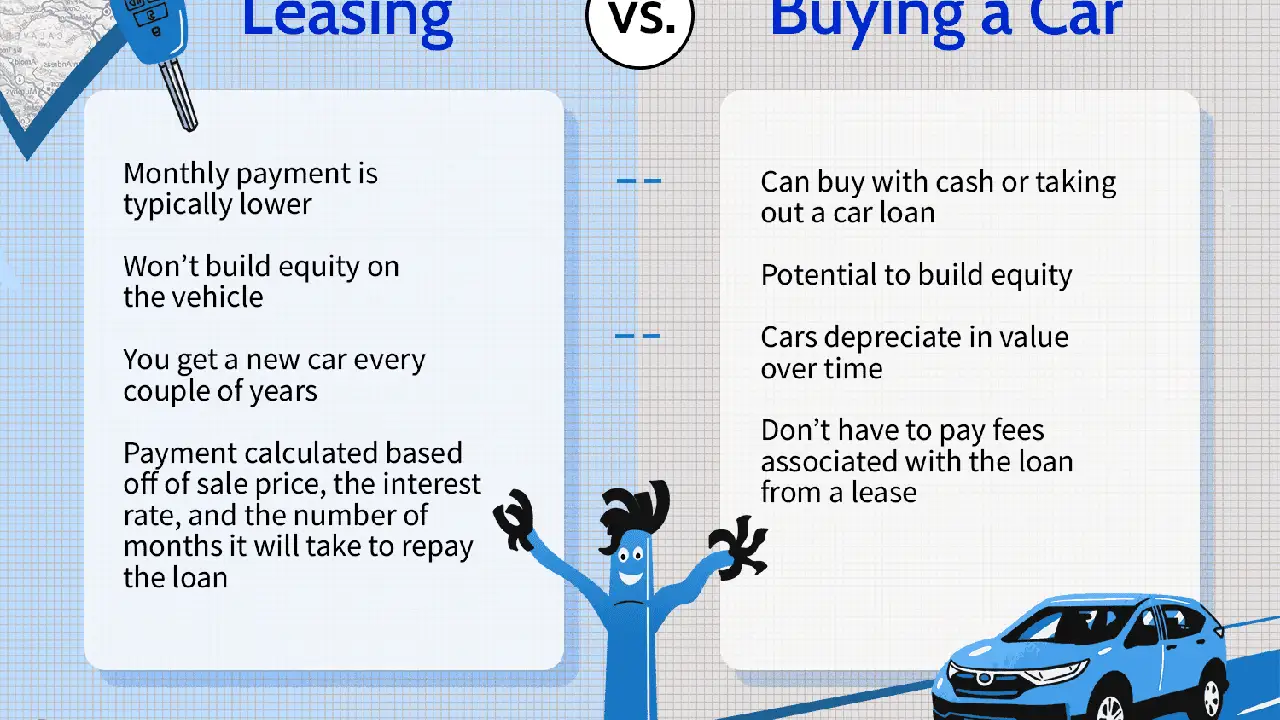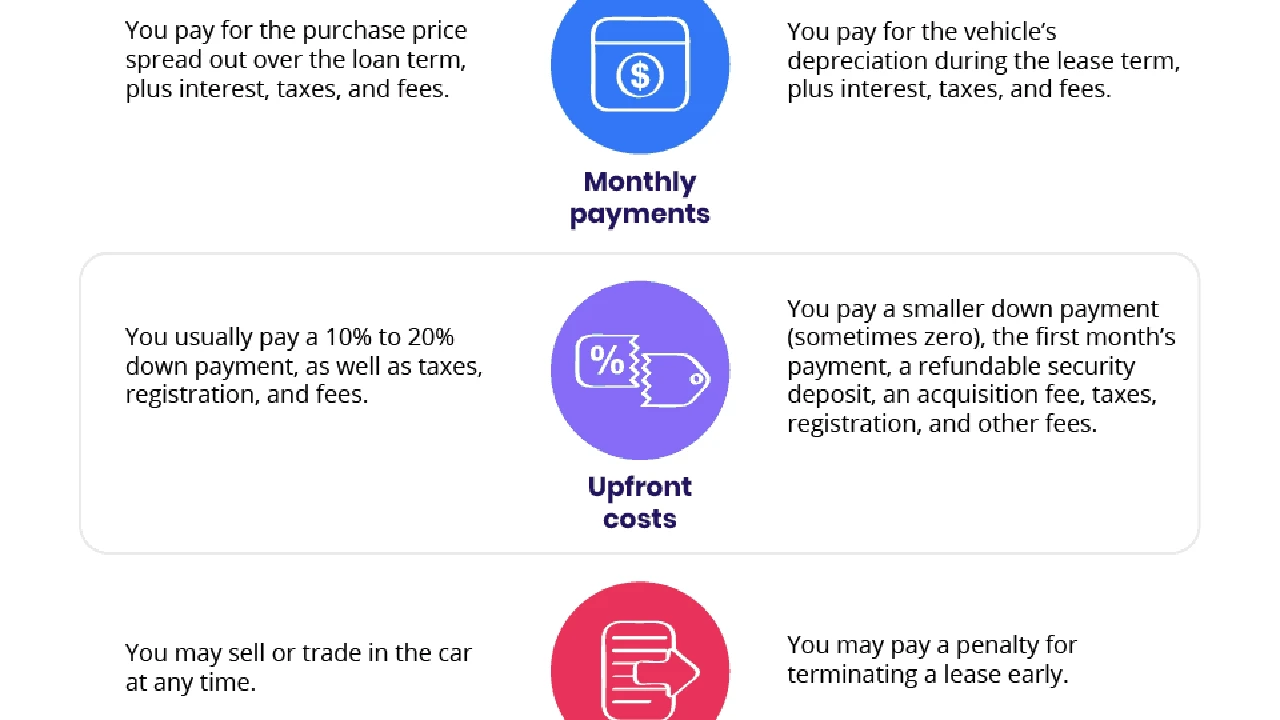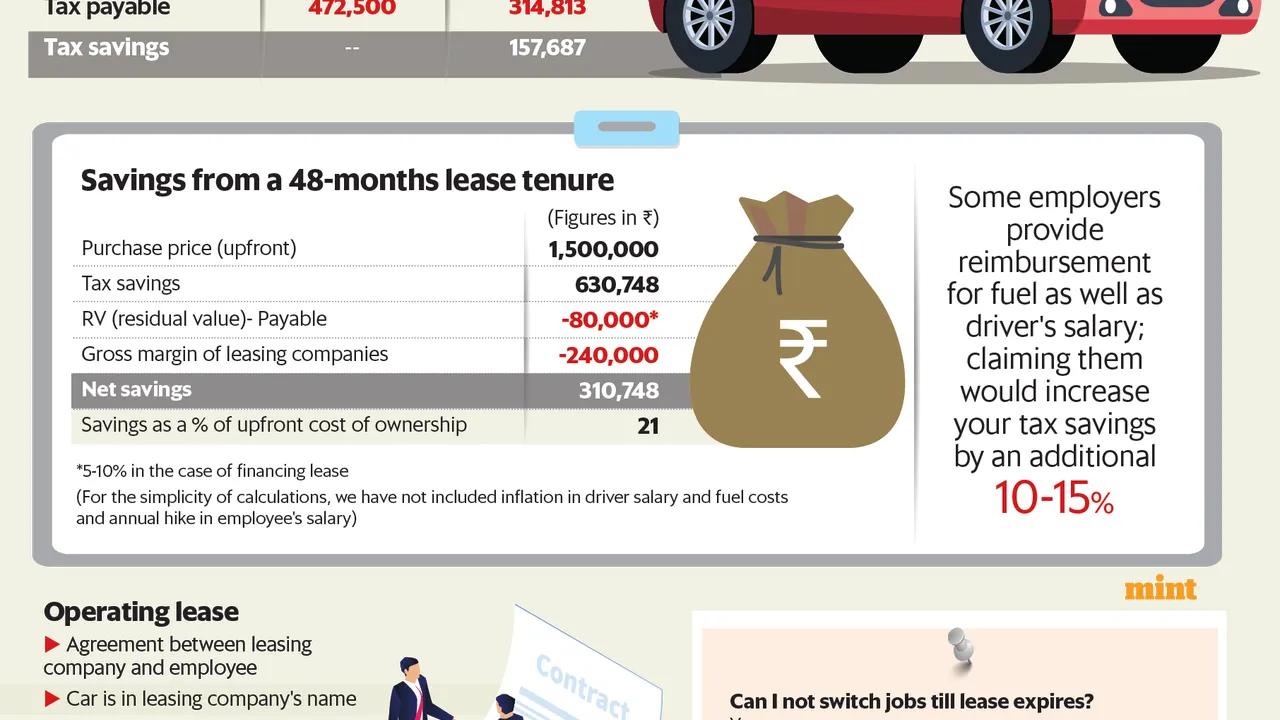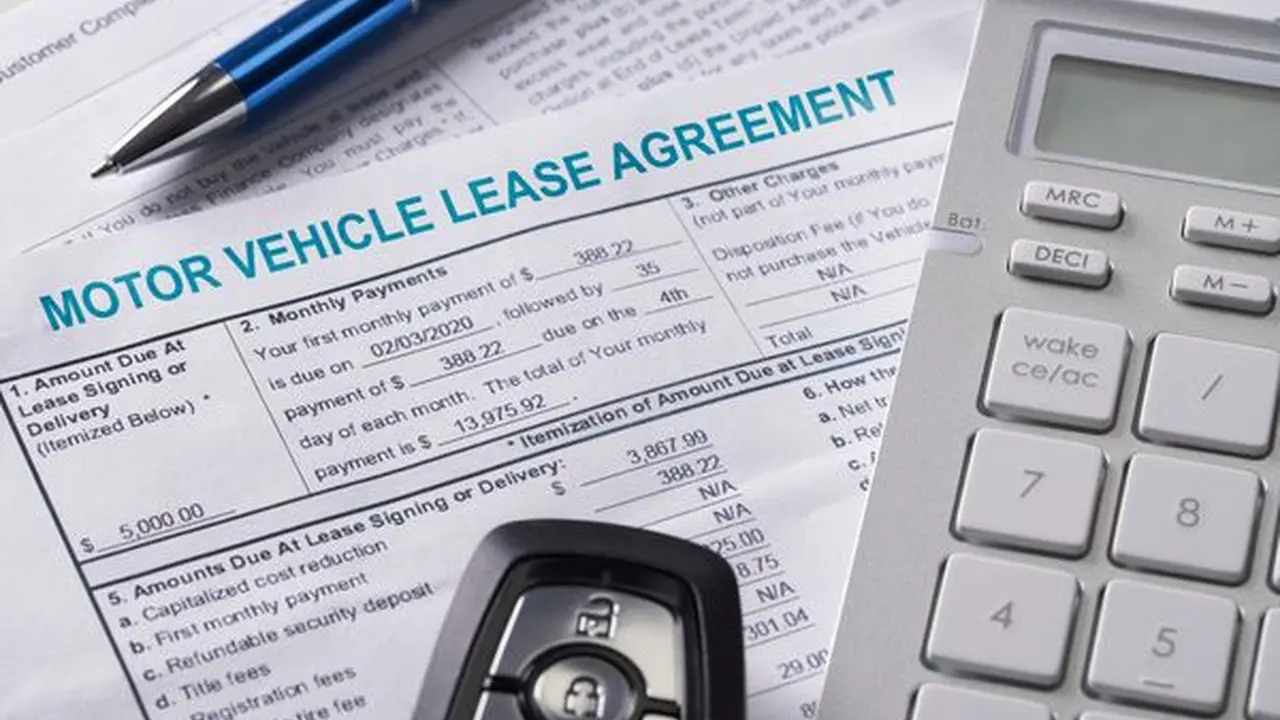Buying a Used Car vs. Leasing a New Car

Used Car Buying Considerations and New Car Leasing Options
So, you're in the market for a new set of wheels, huh? Big decision! But the question is: do you dive into the used car pool or take the plunge with a shiny, new leased vehicle? Both paths have their perks and pitfalls, and figuring out which one suits you best can feel like navigating a maze. Let's break it down, shall we? We'll explore the ins and outs of buying used versus leasing new, covering everything from upfront costs to long-term ownership woes.
The Upfront Costs Face-Off: Used Car vs. New Car Lease
Alright, let's talk money. This is often the biggest factor when deciding between a used car and a new car lease. Generally, buying a used car means a lower initial purchase price. You're paying for depreciation that the previous owner already absorbed. Think of it as getting a discount for someone else's early adoption. However, don't forget about potential maintenance costs lurking beneath the surface. A pre-purchase inspection is a MUST to avoid buying someone else's headache.
Leasing a new car, on the other hand, usually involves a smaller down payment (or sometimes even none at all!). Your monthly payments might also seem lower initially, which can be tempting. But remember, you're essentially renting the car. You're paying for the depreciation you cause during the lease term, plus interest and fees. You won't own the car at the end of the lease. So, while the upfront sting might be less, you're constantly paying and never building equity.
Long-Term Ownership: Used Car Advantages and New Car Lease Limitations
This is where things get interesting. Owning a used car gives you freedom. You can drive as much as you want (within reason, of course!), customize it to your heart's content, and ultimately sell it when you're ready for something new. You're in control. The downside? Repairs. Older cars require more maintenance. Be prepared for unexpected trips to the mechanic. Budgeting for repairs is crucial.
Leasing a new car offers a different kind of freedom – freedom from worrying about major repairs (usually). New cars come with warranties that cover most significant issues during the lease term. You also get to drive a brand-new car with the latest technology and safety features. The catch? Mileage limits. Exceeding the agreed-upon mileage will result in hefty fees. And you're stuck with the car for the entire lease term unless you want to pay significant early termination penalties. Plus, you have to keep the car in good condition to avoid excess wear-and-tear charges at the end of the lease.
Reliability and Maintenance: The Used Car Gamble and the New Car Lease Security
Let’s be honest, buying a used car is a bit of a gamble. You're relying on the previous owner's maintenance habits (or lack thereof). A thorough inspection can help mitigate the risk, but you can never be 100% sure. Unexpected repairs are part of the used car ownership experience. On the flip side, you might find a well-maintained gem that runs like a dream for years to come.
With a new car lease, you have the peace of mind of a warranty. Most repairs are covered, which significantly reduces the risk of unexpected expenses. Regular maintenance is still required (oil changes, tire rotations, etc.), but these are usually predictable and relatively inexpensive. This makes budgeting much easier.
Customization and Freedom: Express Yourself with a Used Car, Stay Standard with a New Car Lease
Want to add a killer sound system? Slam the suspension? Paint flames on the hood? Go for it! When you own a used car, you're the boss. You can customize it to your heart's content. There are no restrictions (within legal limits, of course!). This is a huge appeal for car enthusiasts.
Leasing a new car, however, comes with limitations. You typically can't make any significant modifications. The car needs to be returned in its original condition. This can be frustrating for those who like to personalize their vehicles.
Insurance Costs: Used Car vs. New Car Lease Premiums
Insurance costs can vary depending on several factors, including your driving record, location, and the type of car. Generally, insuring a used car is cheaper than insuring a new car. This is because the value of the car is lower, so the insurance company has less to pay out in the event of an accident.
Leasing a new car often requires comprehensive and collision coverage, which can significantly increase your insurance premiums. The leasing company wants to protect its investment, so they require you to have full coverage. Be sure to factor insurance costs into your overall budget when considering leasing.
Depreciation: The Used Car Advantage and the New Car Lease Reality
Depreciation is the decline in value of a car over time. New cars depreciate rapidly, especially in the first few years. This is why buying a used car can be a smart financial move. The previous owner has already absorbed the bulk of the depreciation.
When you lease a new car, you're essentially paying for the depreciation that occurs during the lease term. You don't own the car at the end of the lease, so you don't benefit from any remaining value. This is one of the biggest drawbacks of leasing.
Specific Car Recommendations: Used Car Options and New Car Lease Deals
Okay, let’s get specific! Here are a few recommendations based on different needs and budgets:
Used Car Recommendations: Reliable and Affordable Options
- Toyota Corolla (2015-2018): Known for its reliability, fuel efficiency, and affordability. A great option for daily commuting. Expect to pay around $12,000 - $18,000 depending on mileage and condition. Usage Scenario: Perfect for students, young professionals, or anyone looking for a dependable and economical car.
- Honda Civic (2016-2019): Similar to the Corolla, the Civic offers excellent reliability and fuel economy. It also tends to have a slightly sportier feel. Price range: $14,000 - $20,000. Usage Scenario: Ideal for city driving and longer road trips. The Civic offers a comfortable and enjoyable driving experience.
- Mazda3 (2014-2018): A fun-to-drive compact car with a stylish interior and good fuel economy. Prices typically range from $11,000 - $17,000. Usage Scenario: Great for those who enjoy driving and want a car that stands out from the crowd.
- Subaru Impreza (2017-2020): Standard all-wheel drive makes it a great choice for those who live in areas with snow or inclement weather. Expect to pay between $15,000 - $22,000. Usage Scenario: Perfect for outdoor enthusiasts and those who need a reliable car for all weather conditions.
New Car Lease Deals: Popular and Appealing Choices
- Honda CR-V: A popular compact SUV known for its practicality, fuel efficiency, and reliability. Lease deals often start around $300-$400 per month with a small down payment. Usage Scenario: Ideal for families or individuals who need more cargo space and a comfortable ride.
- Toyota RAV4: Another excellent compact SUV with a reputation for reliability and resale value. Lease deals are often comparable to the CR-V. Usage Scenario: Similar to the CR-V, the RAV4 is a great choice for families and those who need a versatile vehicle.
- Hyundai Sonata: A stylish and well-equipped mid-size sedan with a comfortable ride and a long warranty. Lease deals can be very attractive, often starting around $250-$350 per month. Usage Scenario: A good option for commuters and those who want a comfortable and fuel-efficient sedan.
- Mazda CX-5: A sporty and stylish compact SUV with a premium interior and engaging driving dynamics. Lease deals may be slightly higher than the CR-V or RAV4, but the CX-5 offers a more upscale experience. Usage Scenario: Great for those who appreciate a well-designed and fun-to-drive SUV.
Comparing Specific Models: Toyota Corolla vs. Honda Civic (Used) and Honda CR-V vs. Toyota RAV4 (New Lease)
Let's dive deeper into a couple of specific comparisons:
Used: Toyota Corolla (2015-2018) vs. Honda Civic (2016-2019)
- Reliability: Both are incredibly reliable, with the Corolla often cited as slightly more bulletproof.
- Fuel Economy: Similar fuel economy, with both averaging around 30-40 MPG combined.
- Driving Experience: The Civic tends to offer a slightly sportier and more engaging driving experience.
- Interior: The Civic's interior might feel a bit more modern in the later model years.
- Price: Prices are generally comparable, but you might find slightly better deals on the Corolla.
- Verdict: If reliability is your top priority, the Corolla is a safe bet. If you value a slightly more engaging driving experience, the Civic is a good choice.
New Lease: Honda CR-V vs. Toyota RAV4
- Space: Both offer ample cargo and passenger space, but the RAV4 might have a slight edge in cargo capacity.
- Fuel Economy: Similar fuel economy, with both achieving excellent MPG.
- Features: Both come standard with a good array of features, but specific trim levels may offer different options.
- Driving Experience: The CR-V generally offers a smoother and more comfortable ride, while the RAV4 might feel a bit more rugged.
- Design: This is subjective, but the RAV4 has a more aggressive and modern design, while the CR-V is more traditional.
- Verdict: If you prioritize a comfortable ride and a more traditional design, the CR-V is a good choice. If you prefer a more rugged design and potentially slightly more cargo space, the RAV4 is a better fit.
Hidden Costs: Used Car Inspections and New Car Lease Fees
Don't forget about the hidden costs! When buying a used car, factor in the cost of a pre-purchase inspection (around $100-$200). This is money well spent to avoid potential problems down the road.
With a new car lease, be aware of various fees, including acquisition fees, disposition fees, and early termination fees. These can add up quickly, so be sure to read the fine print carefully.
The Bottom Line: Making the Right Choice for You
Ultimately, the best choice between buying a used car and leasing a new car depends on your individual needs, budget, and priorities. Consider your driving habits, financial situation, and personal preferences. Do your research, compare different models, and get pre-approved for financing or leasing. And most importantly, don't be afraid to negotiate! Good luck!
:max_bytes(150000):strip_icc()/277019-baked-pork-chops-with-cream-of-mushroom-soup-DDMFS-beauty-4x3-BG-7505-5762b731cf30447d9cbbbbbf387beafa.jpg)






